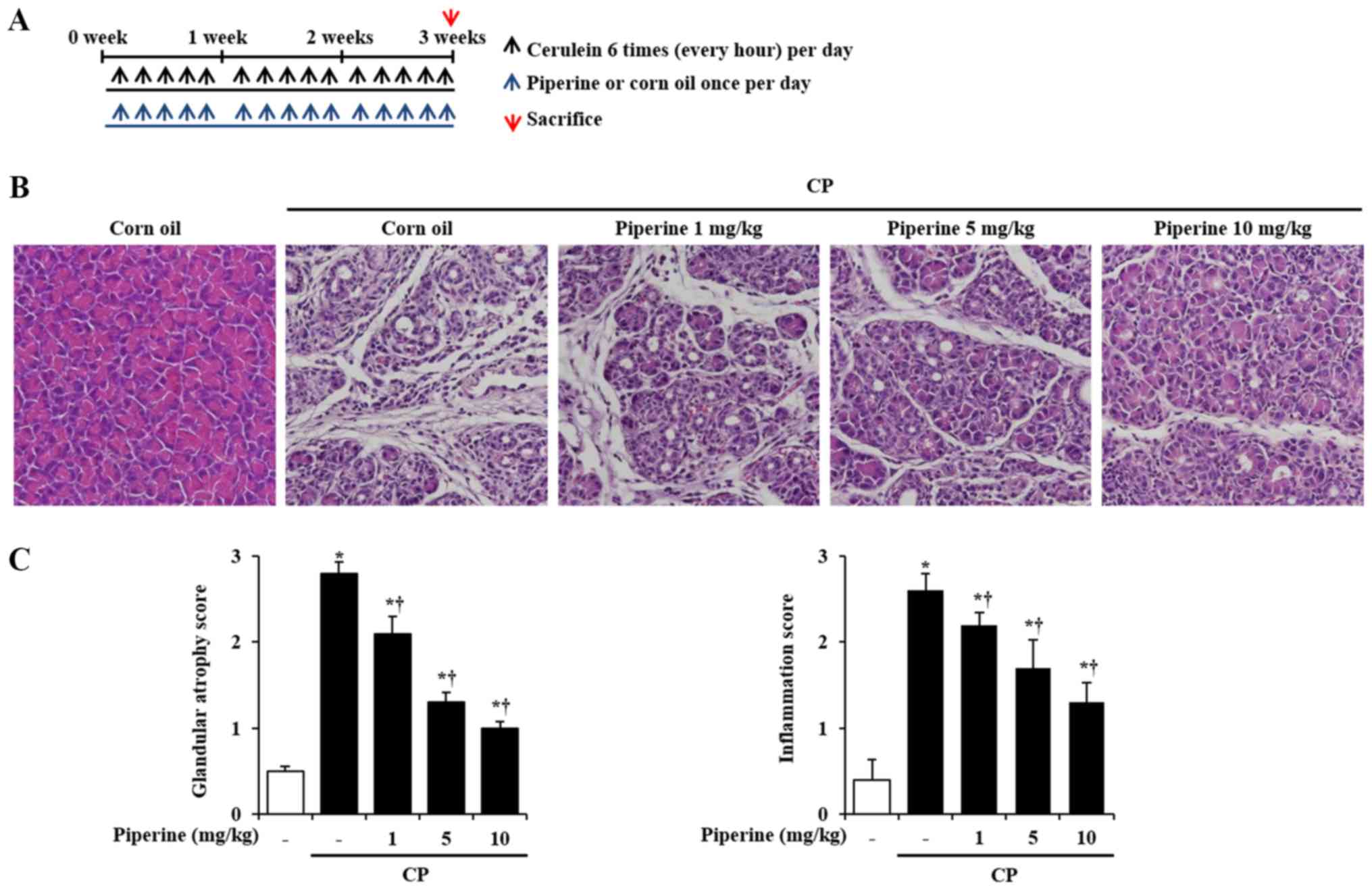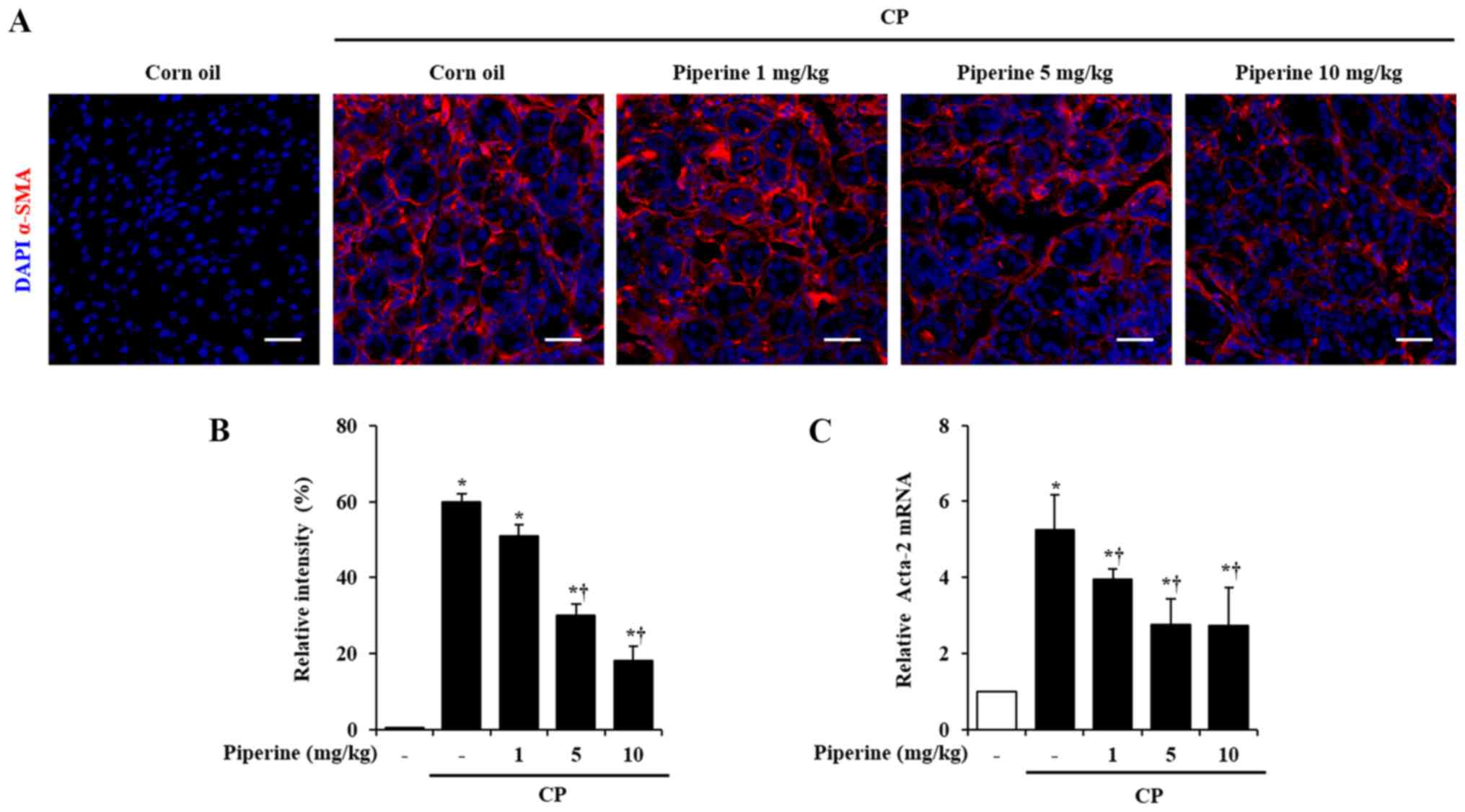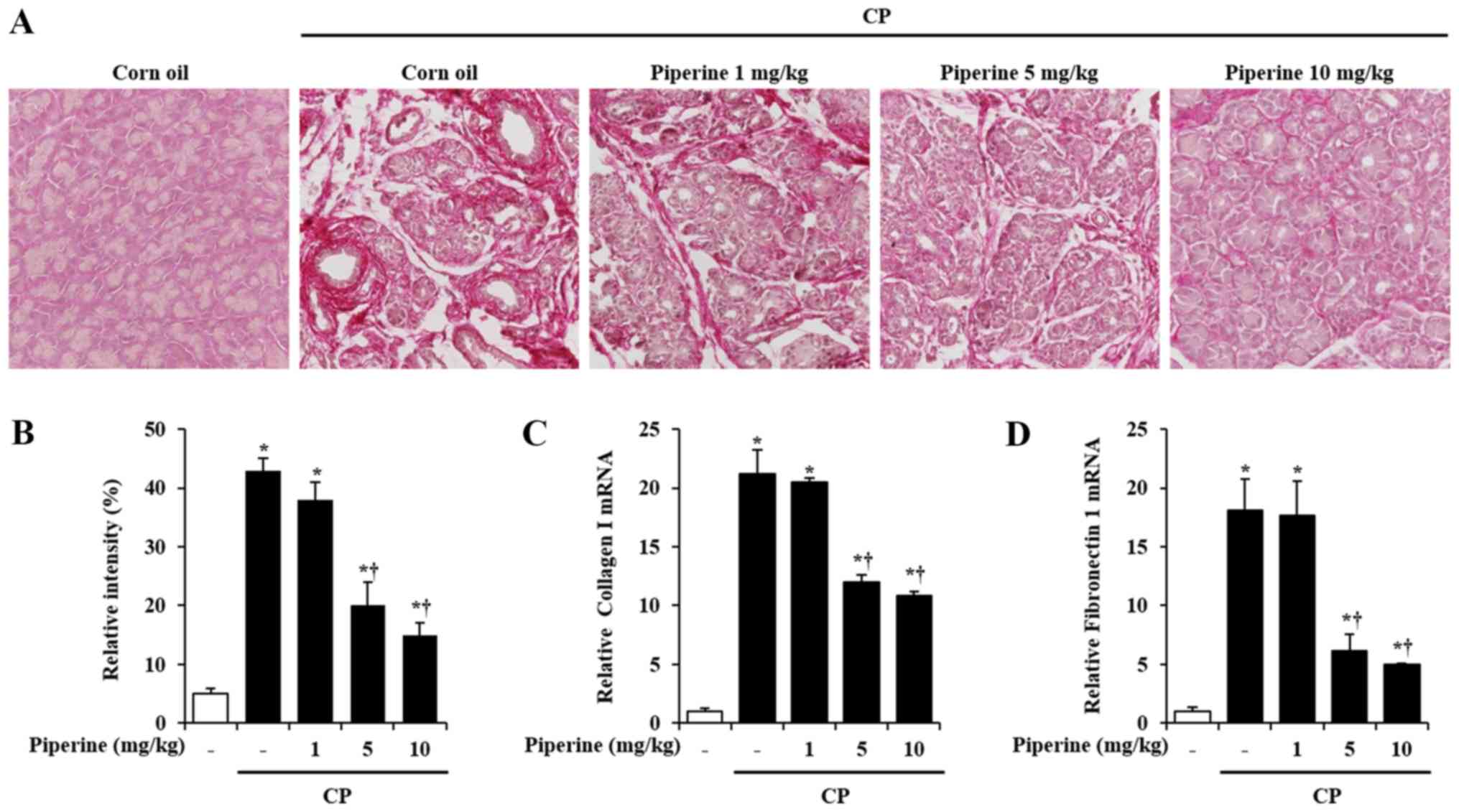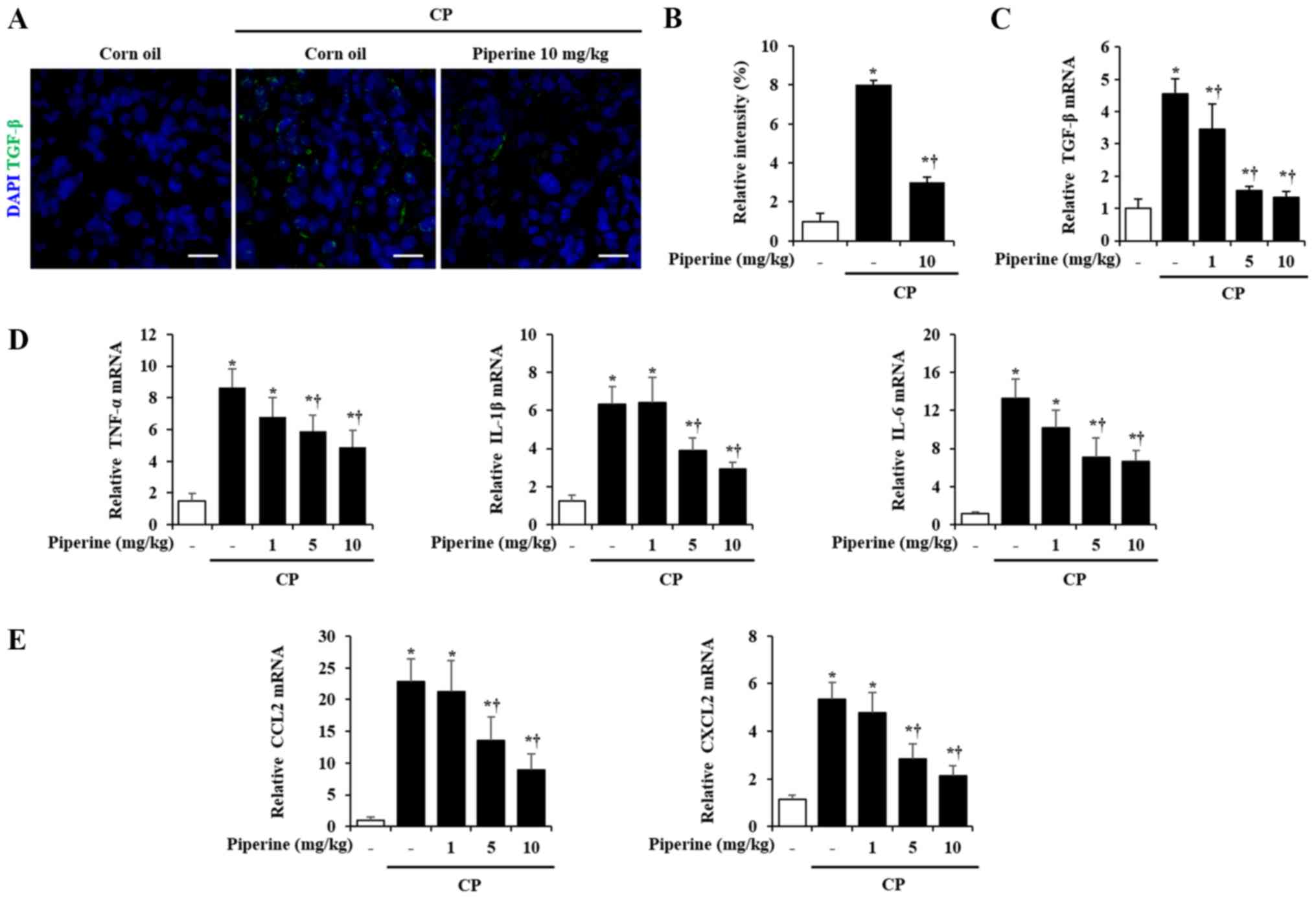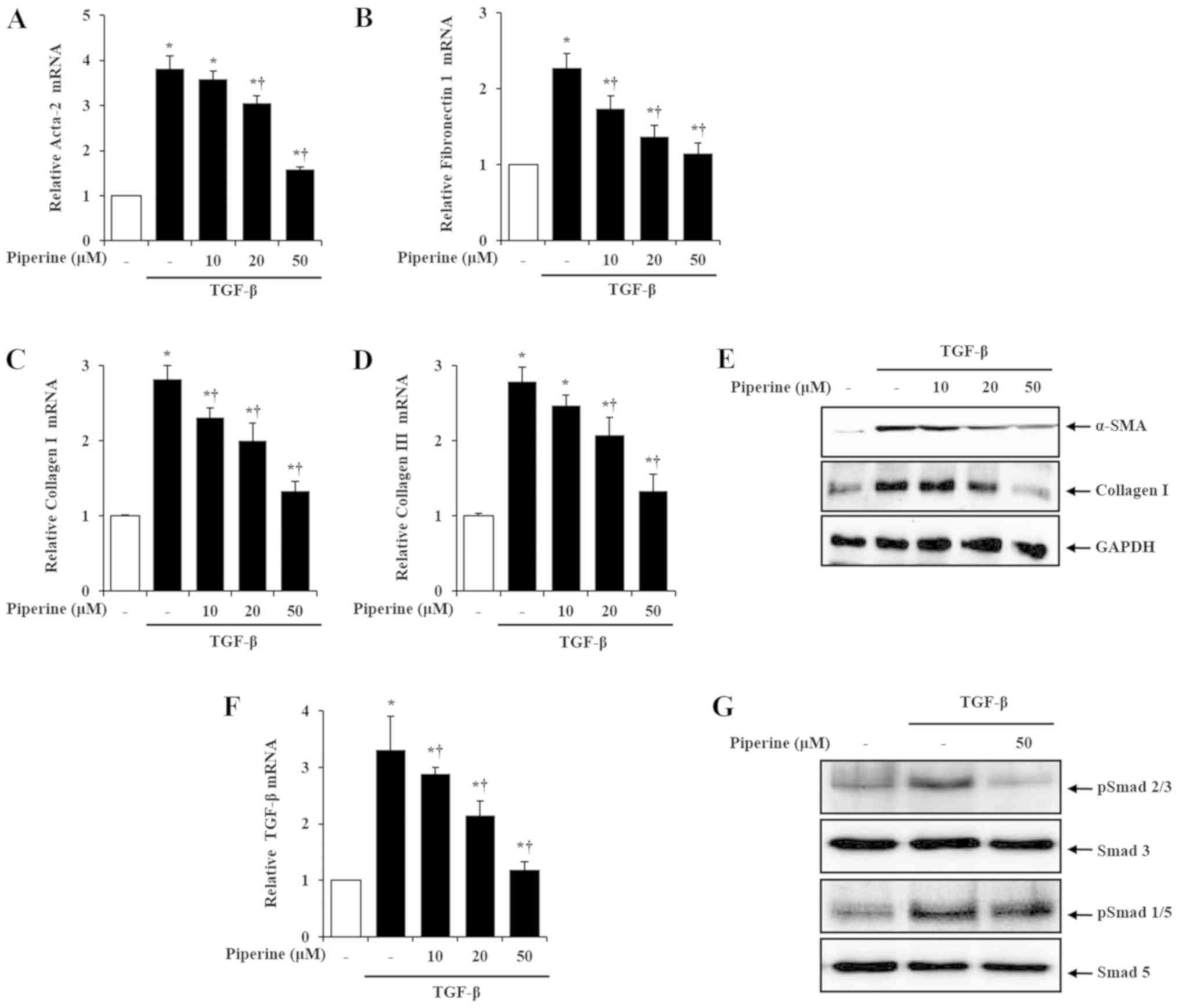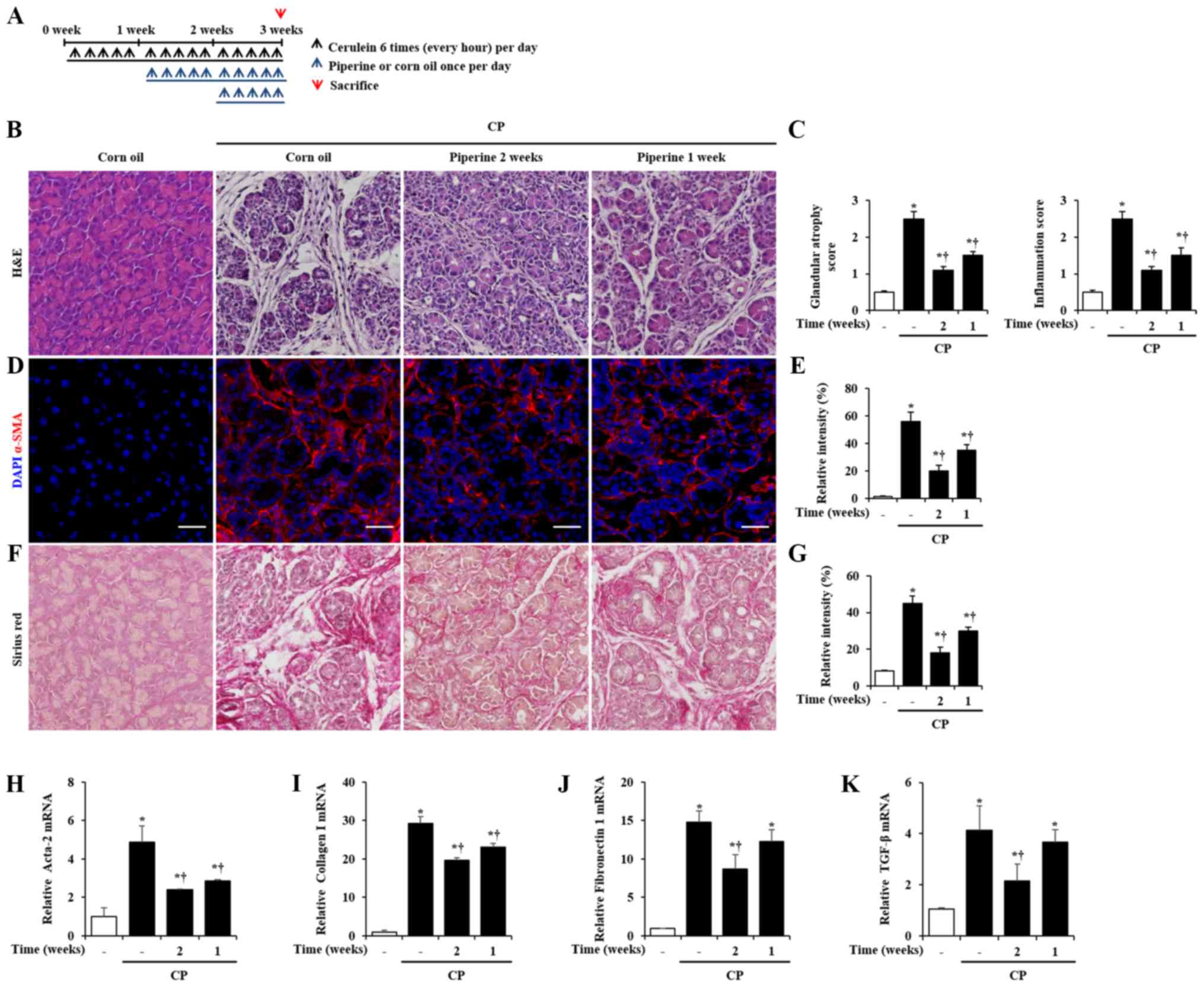|
1
|
Apte M, Pirola R and Wilson J: The
fibrosis of chronic pancreatitis: New insights into the role of
pancreatic stellate cells. Antioxid Redox Signal. 15:2711–2722.
2011. View Article : Google Scholar : PubMed/NCBI
|
|
2
|
Hobbs PM, Johnson WG and Graham DY:
Management of pain in chronic pancreatitis with emphasis on
exogenous pancreatic enzymes. World J Gastrointest Pharmacol Ther.
7:370–386. 2016. View Article : Google Scholar : PubMed/NCBI
|
|
3
|
Yang AL, Vadhavkar S, Singh G and Omary
MB: Epidemiology of alcohol-related liver and pancreatic disease in
the United States. Arch Intern Med. 168:649–656. 2008. View Article : Google Scholar : PubMed/NCBI
|
|
4
|
Robles-Diaz G, Vargas F, Uscanga L and
Fernández-del Castillo C: Chronic pancreatitis in Mexico City.
Pancreas. 5:479–483. 1990. View Article : Google Scholar : PubMed/NCBI
|
|
5
|
Hirota M, Shimosegawa T, Masamune A,
Kikuta K, Kume K, Hamada S, Kihara Y, Satoh A, Kimura K, Tsuji I,
et al: The sixth nationwide epidemiological survey of chronic
pancreatitis in Japan. Pancreatology. 12:79–84. 2012. View Article : Google Scholar : PubMed/NCBI
|
|
6
|
Miyake H, Harada H, Ochi K, Kunichika K,
Tanaka J and Kimura I: Prognosis and prognostic factors in chronic
pancreatitis. Dig Dis Sci. 34:449–455. 1989. View Article : Google Scholar : PubMed/NCBI
|
|
7
|
Ammann RW, Akovbiantz A, Largiader F and
Schueler G: Course and outcome of chronic pancreatitis.
Longitudinal study of a mixed medical-surgical series of 245
patients. Gastroenterology. 86:820–828. 1984.PubMed/NCBI
|
|
8
|
Lowenfels AB, Maisonneuve P, Cavallini G,
Ammann RW, Lankisch PG, Andersen JR, Dimagno EP, Andrén-Sandberg A
and Domellöf L: Pancreatitis and the risk of pancreatic cancer.
International pancreatitis study group. N Engl J Med.
328:1433–1437. 1993. View Article : Google Scholar : PubMed/NCBI
|
|
9
|
Haber PS, Keogh GW, Apte MV, Moran CS,
Stewart NL, Crawford DH, Pirola RC, McCaughan GW, Ramm GA and
Wilson JS: Activation of pancreatic stellate cells in human and
experimental pancreatic fibrosis. Am J Pathol. 155:1087–1095. 1999.
View Article : Google Scholar : PubMed/NCBI
|
|
10
|
Aghdassi AA, Mayerle J, Christochowitz S,
Weiss FU, Sendler M and Lerch MM: Animal models for investigating
chronic pancreatitis. Fibrogenesis Tissue Repair. 4:262011.
View Article : Google Scholar : PubMed/NCBI
|
|
11
|
Turner R: Acute pancreatitis is a chronic
disease. Pancreatic Dis Ther. 3:1182013. View Article : Google Scholar
|
|
12
|
Wehr AY, Furth EE, Sangar V, Blair IA and
Yu KH: Analysis of the human pancreatic stellate cell secreted
proteome. Pancreas. 40:557–566. 2011. View Article : Google Scholar : PubMed/NCBI
|
|
13
|
Schneider A, Löhr JM and Singer MV: The
M-ANNHEIM classification of chronic pancreatitis: Introduction of a
unifying classification system based on a review of previous
classifications of the disease. J Gastroenterol. 42:101–119. 2007.
View Article : Google Scholar : PubMed/NCBI
|
|
14
|
Lankisch PG, Löhr-Happe A, Otto J and
Creutzfeldt W: Natural course in chronic pancreatitis. Pain,
exocrine and endocrine pancreatic insufficiency and prognosis of
the disease. Digestion. 54:148–155. 1993. View Article : Google Scholar : PubMed/NCBI
|
|
15
|
Singh YN: Kava: An overview. J
Ethnopharmacol. 37:13–45. 1992. View Article : Google Scholar : PubMed/NCBI
|
|
16
|
Srinivasan K: Black pepper and its pungent
principle-piperine: A review of diverse physiological effects. Crit
Rev Food Sci Nutr. 47:735–748. 2007. View Article : Google Scholar : PubMed/NCBI
|
|
17
|
Bae GS, Kim MS, Jeong J, Lee HY, Park KC,
Koo BS, Kim BJ, Kim TH, Lee SH, Hwang SY, et al: Piperine
ameliorates the severity of cerulein-induced acute pancreatitis by
inhibiting the activation of mitogen activated protein kinases.
Biochem Biophys Res Commun. 410:382–390. 2011. View Article : Google Scholar : PubMed/NCBI
|
|
18
|
Bae GS, Kim MS, Jung WS, Seo SW, Yun SW,
Kim SG, Park RK, Kim EC, Song HJ and Park SJ: Inhibition of
lipopolysaccharide-induced inflammatory responses by piperine. Eur
J Pharmacol. 642:154–162. 2010. View Article : Google Scholar : PubMed/NCBI
|
|
19
|
Van Laethem JL, Robberecht P, Résibois A
and Deviére J: Transforming growth factor beta promotes development
of fibrosis after repeated courses of acute pancreatitis in mice.
Gastroenterology. 110:576–582. 1996. View Article : Google Scholar : PubMed/NCBI
|
|
20
|
Livak KJ and Schmittgen TD: Analysis of
relative gene expression data using real-time quantitative PCR and
the 2(-Delta Delta C(T)) method. Methods. 25:402–408. 2001.
View Article : Google Scholar : PubMed/NCBI
|
|
21
|
Masamune A, Watanabe T, Kikuta K and
Shimosegawa T: Roles of pancreatic stellate cells in pancreatic
inflammation and fibrosis. Clin Gastroenterol Hepatol 7 (11 Suppl).
S48–S54. 2009. View Article : Google Scholar
|
|
22
|
Vinokurova LV, Zhivaeva NS,
Tsaregorodtseva TM and Serova TI: A cytokine status in chronic
alcoholic and biliary pancreatitis. Ter Arkh. 78:57–60. 2006.(In
Russian). PubMed/NCBI
|
|
23
|
Zhang H, Neuhöfer P, Song L, Rabe B,
Lesina M, Kurkowski MU, Treiber M, Wartmann T, Regnér S, Thorlacius
H, et al: IL-6 trans-signaling promotes pancreatitis-associated
lung injury and lethality. J Clin Invest. 123:1019–1031. 2013.
View Article : Google Scholar : PubMed/NCBI
|
|
24
|
Shek FW, Benyon RC, Walker FM, McCrudden
PR, Pender SL, Williams EJ, Johnson PA, Johnson CD, Bateman AC,
Fine DR and Iredale JP: Expression of transforming growth
factor-beta 1 by pancreatic stellate cells and its implications for
matrix secretion and turnover in chronic pancreatitis. Am J Pathol.
160:1787–1798. 2002. View Article : Google Scholar : PubMed/NCBI
|
|
25
|
Vogelmann R, Ruf D, Wagner M, Adler G and
Menke A: Effects of fibrogenic mediators on the development of
pancreatic fibrosis in a TGF-beta1 transgenic mouse model. Am J
Physiol Gastrointest Liver Physiol. 280:G164–G172. 2001. View Article : Google Scholar : PubMed/NCBI
|
|
26
|
Gressner AM, Weiskirchen R, Breitkopf K
and Dooley S: Roles of TGF-beta in hepatic fibrosis. Front Biosci.
7:d793–d807. 2002. View
Article : Google Scholar : PubMed/NCBI
|
|
27
|
Chung H, Ramachandran R, Hollenberg MD and
Muruve DA: Proteinase-activated receptor-2 transactivation of
epidermal growth factor receptor and transforming growth factor-β
receptor signaling pathways contributes to renal fibrosis. J Biol
Chem. 288:37319–37331. 2013. View Article : Google Scholar : PubMed/NCBI
|
|
28
|
Fu M, Sun ZH and Zuo HC: Neuroprotective
effect of piperine on primarily cultured hippocampal neurons. Biol
Pharm Bull. 33:598–603. 2010. View Article : Google Scholar : PubMed/NCBI
|
|
29
|
Bang JS, Oh DH, Choi HM, Sur BJ, Lim SJ,
Kim JY, Yang HI, Yoo MC, Hahm DH and Kim KS: Anti-inflammatory and
antiarthritic effects of piperine in human interleukin
1beta-stimulated fibroblast-like synoviocytes and in rat arthritis
models. Arthritis Res Ther. 11:R492009. View Article : Google Scholar : PubMed/NCBI
|
|
30
|
Taqvi SI, Shah AJ and Gilani AH: Blood
pressure lowering and vasomodulator effects of piperine. J
Cardiovasc Pharmacol. 52:452–458. 2008. View Article : Google Scholar : PubMed/NCBI
|
|
31
|
Mehmood MH and Gilani AH: Pharmacological
basis for the medicinal use of black pepper and piperine in
gastrointestinal disorders. J Med Food. 13:1086–1096. 2010.
View Article : Google Scholar : PubMed/NCBI
|
|
32
|
Diwan V, Poudyal H and Brown L: Piperine
attenuates cardiovascular, liver and metabolic changes in high
carbohydrate, high fat-fed rats. Cell Biochem Biophys. 67:297–304.
2013. View Article : Google Scholar : PubMed/NCBI
|
|
33
|
Durgaprasad S, Pai CG, Vasanthkuma r,
Alvres JF and Namitha S: A pilot study of the antioxidant effect of
curcumin in tropical pancreatitis. Indian J Med Res. 122:315–318.
2005.PubMed/NCBI
|
|
34
|
Schneider E, Schmid-Kotsas A, Zhao J,
Weidenbach H, Schmid RM, Menke A, Adler G, Waltenberger J, Grünert
A and Bachem MG: Identification of mediators stimulating
proliferation and matrix synthesis of rat pancreatic stellate
cells. Am J Physiol Cell Physiol. 281:C532–C543. 2001. View Article : Google Scholar : PubMed/NCBI
|
|
35
|
Omary MB, Lugea A, Lowe AW and Pandol SJ:
The pancreatic stellate cell: A star on the rise in pancreatic
diseases. J Clin Invest. 117:50–59. 2007. View Article : Google Scholar : PubMed/NCBI
|
|
36
|
Apte MV, Pirola RC and Wilson JS:
Pancreatic stellate cells: A starring role in normal and diseased
pancreas. Front Physiol. 3:3442012. View Article : Google Scholar : PubMed/NCBI
|
|
37
|
Chen B, Li J, Fellows GF, Sun Z and Wang
R: Maintaining human fetal pancreatic stellate cell function and
proliferation require β1 integrin and collagen I matrix
interactions. Oncotarget. 6:14045–14059. 2015.PubMed/NCBI
|
|
38
|
Prud'homme GJ: Pathobiology of
transforming growth factor beta in cancer, fibrosis and immunologic
disease, and therapeutic considerations. Lab Invest. 87:1077–1091.
2007. View Article : Google Scholar : PubMed/NCBI
|
|
39
|
Czaja MJ, Weiner FR, Flanders KC,
Giambrone MA, Wind R, Biempica L and Zern MA: In vitro and in vivo
association of transforming growth factor-beta 1 with hepatic
fibrosis. J Cell Biol. 108:2477–2482. 1989. View Article : Google Scholar : PubMed/NCBI
|
|
40
|
Ma ZG, Yuan YP, Zhang X, Xu SC, Wang SS
and Tang QZ: Piperine attenuates pathological cardiac fibrosis via
PPAR-γ/AKT pathways. EBioMedicine. 18:179–187. 2017. View Article : Google Scholar : PubMed/NCBI
|
|
41
|
Yang L, Shen J, He S, Hu G, Shen J, Wang
F, Xu L, Dai W, Xiong J, Ni J, et al: L-cysteine administration
attenuates pancreatic fibrosis induced by TNBS in rats by
inhibiting the activation of pancreatic stellate cell. PLoS One.
7:e318072012. View Article : Google Scholar : PubMed/NCBI
|
|
42
|
Fabregat I, Moreno-Càceres J, Sánchez A,
Dooley S, Dewidar B, Giannelli G and Ten Dijke P; IT-LIVER
Consortium, : TGF-β signaling and liver disease. FEBS J.
283:2219–2232. 2016. View Article : Google Scholar : PubMed/NCBI
|
|
43
|
Wynn TA: Cellular and molecular mechanisms
of fibrosis. J Pathol. 214:199–210. 2008. View Article : Google Scholar : PubMed/NCBI
|
|
44
|
Ohnishi H, Miyata T, Yasuda H, Satoh Y,
Hanatsuka K, Kita H, Ohashi A, Tamada K, Makita N, Iiri T, et al:
Distinct roles of Smad2-, Smad3-, and ERK-dependent pathways in
transforming growth factor-beta1 regulation of pancreatic stellate
cellular functions. J Biol Chem. 279:8873–8878. 2004. View Article : Google Scholar : PubMed/NCBI
|
|
45
|
Xu L, Zheng N, He Q, Li R, Zhang K and
Liang T: Puerarin, isolated from Pueraria lobata (Willd.),
protects against hepatotoxicity via specific inhibition of the
TGF-β1/Smad signaling pathway, thereby leading to anti-fibrotic
effect. Phytomedicine. 20:1172–1179. 2013. View Article : Google Scholar : PubMed/NCBI
|















